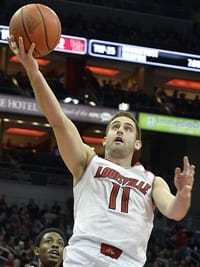The NCAAs definition of fairness doesnt pass muster

The hot topic of conversation this Tuesday morning is the absurd seeding received by the University of Louisville men's basketball team, the defending national champion, in the upcoming NCAA Tournament.
It seems that the "seeding" of the Cards was taken literally by the committee and included burying them deep in the ground and throwing dirt on top of the aberrant placement of the nations' fifth-ranked team. Loyal fans of the Cardinals were not the only folks in the college basketball community startled by the disrespect given Louisville as all commentators except the clueless Clark Kellogg joined in the outcry.
Advertisement
The first question asked of Selection Committee Chairman Ron Wellman was about SMU and its omission from the tournament. SMU was a team ranked in the top 25 at the end of the season but was not selected by the committee. Wellman's explanation was that "the glaring weakness of SMU was their schedule."
The second question asked of Wellman concerned Louisville. His explanation was that "what came before (the end of season) wasn't spectacular. The committee's responsibility is to look at an entire body of work."
In true chairperson doublespeak worthy of Nancy Pelosi, Wellman in describing Virginia's No. 1 seed said that "if Michigan had won their championship (Big Ten), they would have been on the "one' line. If Michigan and Virginia had both lost their (tournament) championships, Villanova would have been on the one line."
There you have it: For Michigan, Villanova and especially Virginia it was how they did at the end of their season. But for a Louisville team that won its league and the tournament championship it was the "entire body of work."
Now you know why I have a huge disdain for the NCAA and its "political" way of doing business.
Several times Wellman and anyone else involved in discussions about tournament seeding referred to "strength of schedule" (SOS), RPI (Ratings Percentage Index) and in the case of ESPN commentators BPI (Basketball Power Index). SOS and RPI are used extensively by the committee in making their selections and seeding. BPI is an index created by ESPN that includes more variables than the SOS and RPI, including injuries, style of play and "eye test" (how good do they look).
My problem with SOS and RPI is that they both have to begin with a basis that is determined subjectively by a wizard in a back room who is not Oz. As a matter of fact, no one seems to know how the preseason rankings are created or by whom. Which is strange considering that the info coming from that room becomes the guideline for the entire season and tournament in ranking and seeding teams. I have wondered all season how Kansas with all its losses is No. 1 in SOS until I found an obscure list that contained the ranking by conference of all college leagues. According to the edict of some unknown person or persons, the Big 12 is first and the Big 10 second. That is determined before the season even begins. That means that all games against Big 12 or Big 10 teams count for more than those against the American (8), WCC (9) or CUSA (13).
In the five-point explanation of SOS, point No. 2 says the following: "Know that each team at the beginning of the season is ranked according to various factors before they have ever played a game. Those factors include, but are not limited to, team won-loss history, returning starters, and newly signed recruits."
There you have it: It's all guesswork. Once a team receives its place in the pecking order, it is locked in stone. An example is the No. 1 ranking of Kentucky at the beginning of the season. That means that every team that plays Kentucky gets a lot of points whether they win or lose.
I am also not a big fan of the various polls that are updated every week but seem to do a better job of identifying deserving teams than the NCAA Selection Committee. Louisville is a prime example. The Cards are currently ranked fifth in the AP poll and third in the coaches' poll. But according to the preseason garbage produced by the NCAA, UofL is 13th, thus its No. 4 seed. Interestingly, the Cards are fourth in the BPI.
But let's get to the bottom line: When it comes to hard choices by the committee, it's all about, "Who's your daddy"? In other words, who is in the room that can do us favors. In the case of the nine-member Selection Committee, it is a case of, "Take care of your friends." There were no representatives from the AAC in the group, but there were two from the ACC. With more than 25 conferences represented in DI basketball, it seems they could spread the wealth instead of two from one conference.
Maybe that explains how North Carolina State of the ACC got the last position instead of SMU or Wisconsin Green Bay, who were much more deserving. It also might explain how Virginia of the ACC received a No. I seed with six losses, including three to teams outside the Top 25. Don't you just love the NCAA and its quest for "fairness?"